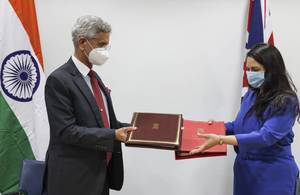
Multiculturalist Ideology (Part One): A Rationale For Race War Politics
An Examination Of The Logic of Multiculturalism

An Examination Of The Logic of Multiculturalism

For those who may have missed it amidst the news of the recent various elections, the UK has entered a new partnership (Memorandum of Understanding). Priti Patel, the Home Secretary, has signed a new deal for a ‘migration and mobility’ partnership between India and the UK (described as the participants). Yes:
‘Her Majesty’s government of the United Kingdom of Great Britain and Northern Ireland (“the UK”) and the government of the Republic of India (“India”), hereafter collectively referred to as “the Participants”,
have decided the following in this MoU [Memorandum of Understanding]…’
There then follows a series of measures to increase immigration between the UK, population 65 million, and India, population estimated to be 1.38 billion in 2020. How could this possibly go wrong?
Priti Patel’s new partnership with India is consistent with her consistently pro-mass immigration stance (eg see here, here and here). She is keen to reduce the English nation into being a minority in England. Even though the vast majority of immigrants settle in England, the interests of the English do not get any consideration.
For example, regarding students, the MoU states: ‘Each Participant will allow the entry and stay of nationals of the other Participant’s country for the purpose of study, which may include permitted work placements and vocational training.’ Consequently:
‘The Participants will promote the take-up of higher education opportunities by nationals of each other’s countries through initiatives such as student fairs, university missions and education expos to raise awareness and understanding of the educational opportunities including scholarship schemes, assistance for internships and the relevant immigration laws and regulations. The UK will consider disseminating information on various opportunities tailored to Indian students.’
And:
‘The UK will promote opportunities for Indian nationals studying in the UK to remain in the UK to undertake skilled work following the successful completion of their studies. Indian nationals who successfully complete their studies and who wish to supplement their training with professional experience in the UK may apply to remain in the UK on a work-based immigration route. This may include routes for skilled workers, and for those working or seeking work post-study, as specified in the UK Immigration Rules. Accordingly, the UK will grant permission to stay in the UK for two years to students who have successfully completed an undergraduate and master’s programme and for three years to those completing their PhD. They will be allowed to seek or take up employment related to their training during this period without being subject to the situation of the labour market. On expiry of this period, those who are already in employment or have a promise of employment who meet the requirements in the UK Immigration Rules may continue to reside in the UK to carry out their professional activity.’
The MoU is positively eager to maximise Indian immigration into England:
‘The Participants will encourage the mobility of skilled workers between Participant countries and to this end will create optimal conditions for establishing contacts and exchange of knowledge between employers’ organisations in different sectors of the economy. The Participants will keep each other informed of the conditions for entry, stay and skilled work in their respective countries, and of any developments in their respective labour markets and of the possibilities they offer … The Participants will cooperate on the organisation of promotional actions to facilitate the access of nationals of the other Participant’s country to offers of employment suited to their profile. The UK will consider favourably offering information tailored to skilled workers from India and about measures to facilitate their recruitment and immigration. The Participants will facilitate recruitment of specific skilled workers like nurses and health care professionals including through entering into bilateral agreements where appropriate.’
Under the heading ‘Encouraging the mobility of skills and talents’, the MoU states:
‘The UK will take steps to encourage the visit of Indian nationals wishing to place their skills at the service of the bilateral relationship and to contribute via their professional projects to the economic development and influence of UK and India. To that end, the UK will facilitate the issuance of visas to skilled Indian nationals with a project of an economic, scientific, technological, cultural or humanitarian nature, likely to make a significant contribution to the development of relations between the two countries to work, in accordance with the UK Immigration Rules. The visa will be issued for the length of the employment up to a maximum of 5 years and can be renewed as per extant rules.’
So it goes on. Does this look like a government determined to take back control of the UK’s borders? Or does it look like the product of those who are drunk with arrogance and are determined to speed up the Third World colonization of England?
Regarding illegal immigration, the MoU states (italics my own emphasis):
‘Where the requested Participant does not accept a request for repatriation of the person, it will share the relevant reasons. The decision of the requested Participant is final, but it may agree to consider any reasonable request to review its decision, where the requesting Participant has new evidence or considers there has been a misunderstanding of the evidence.’
In other words, as even the average cretin can see, India can simply refuse to accept the return of their illegal immigrants.
The English are supposed to continue to put up with this.